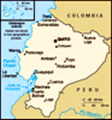Advertisement
Published: October 13th 2009
We left Quito after only one day when we checked out the Mitad del Mundo (the middle of the world monument that marks where the equator crosses through Ecuador), wash some laundry and catch up on some internet time.
We were heading to the Black Sheep Inn, an ecolodge that we had read about that had great reviews with regards to its sustainable living, recycling and permaculture setup. The lodge is located in a more remote area of Ecuador, near a village called Chugchilan, which is nestled within the Andean Ranges. We were picked up at our hotel by the flying Dutchman - a Dutch expat, who thought that he was a professional rally driver - who owns a 4WD and runs a taxi service to the ecolodge when required, at a cost of US$100. We were able to split the cost with another couple, who were heading to the lodge from Quito. The other transport option was to use a chicken bus, which would have taken much longer and been less comfortable although much less expensive.
We arrived at the lodge in record time and thankfully alive. After a run down on how the honesty system worked by

 Two seats for rotational use
Two seats for rotational use
Wood chips for use when finishedMichelle and Andy, the lodge founders and operators over the last 15 years, we were shown to the bunkhouse by their volunteer.
There was a lot that we wanted to learn about the lodge, but also a lot to see and do locally and around the area. We were advised to relax and check out for ourselves how the place was and is being constructed, enjoy the hospitality, do some hiking in the Andes (which we needed to do in preparation for our upcoming trek to Machu Picchu), and check out some local sights. Then on our last day there, they would explain their processes and the importance of their eco-home (lodge) and their continual move towards sustainable living. This sounded liked the best idea, so we dumped our stuff and took off for a walk around the ridge that overlooked the lodge and the surrounding farm lands of this part of the Andes.
Over the proceeding days, we spent most of our time exploring some of the sights around the area using local guides. Rachael hiked up and back to a cloudforest, where I met her for lunch after riding there on horseback. We also caught a

 The bunkhouse
The bunkhouse
3 levels - we stayed on the 2nd level.lift to the top of a volcanic crater lake called Lake Quilatoa, where we then hiked 4 hours back to the lodge. We did some other shorter walks, close to the lodge to check out the area, as well as to ensure that we were aclimatised to the altitudes and ready for our Inca trek. Otherwise, we hung out at the lodge observing the sustainable living practices that exist there, meeting other travellers and in the evenings enjoying the warmth of a nice fire and some red wine.
The dry composting dunnies, are one of the most impressive setups there. As the lodge is built into the side of a hill, the toilets are constructed spilt-level style, which provides a great view of the Andes whilst sitting there. Wood chip or other natural organic mulch is used to break down the human waste, which is all piled below the dunny and accessed from the lower level of the structure. This is ventilated, so takes away any smell from the inside of the dunny itself. There are 2 seats to allow for rotation and as well as gardens in there, where they grow herbs, veges, fruits, flowers and other plants.

 Shower room built using bottles
Shower room built using bottles
The white building on the left is the dunnyThese are watered by the wash basin and fertilised by the compost being created below, closing the recycling loop.
Other eco and ethno procedures of the Black Sheep Inn (BSI) include a waste water system, where the wast water runs through a separator system before being reused in the gardens or for other purposes; use of a solar power pump; and use of recycled bottles and other rubbish as construction materials. The use of home grown or locally grown fruit and vegetables are served and people from the local village are employed as staff and guides. Profits from the lodge are also used to set up a recycling system, that Andy is active in managing, to provide education in eco-living and permiculture practices for the local village people and communities, amongst other projects.
As well as having a great time exploring this area of the world, and meeting other people, we were really inspired and challenged by the set up of the BSI and the thoughts of the proprietors and staff towards sustainable living and our earth in general.
Advertisement
Tot: 0.191s; Tpl: 0.025s; cc: 19; qc: 68; dbt: 0.1276s; 1; m:domysql w:travelblog (10.17.0.13); sld: 1;
; mem: 1.2mb

















